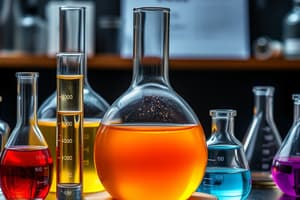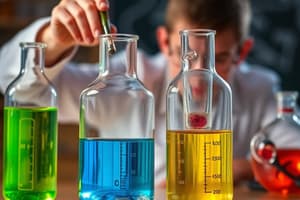Podcast
Questions and Answers
What distinguishes theories from laws in scientific understanding?
What distinguishes theories from laws in scientific understanding?
- Laws provide explanations for phenomena, while theories describe them.
- Theories are unchanging while laws can evolve.
- Theories are modified as new evidence emerges, whereas laws remain constant. (correct)
- Laws are derived from empirical evidence, while theories are not.
Which of the following best defines scientific inquiry?
Which of the following best defines scientific inquiry?
- The tendency of scientists to confirm existing theories without questioning.
- The various methods through which scientists study the natural world. (correct)
- A rigid process that follows predefined steps without flexibility.
- The use of scientific tools exclusively in laboratory settings.
Why is scientific literacy important in today's society?
Why is scientific literacy important in today's society?
- It focuses solely on technological advancements rather than understanding.
- It enables informed decision-making and problem-solving. (correct)
- It emphasizes the acceptance of all scientific claims as true.
- It allows individuals to memorize scientific facts without understanding.
What role does skepticism play in scientific inquiry?
What role does skepticism play in scientific inquiry?
What is a critical component of scientific literacy?
What is a critical component of scientific literacy?
What is the first step in the scientific method?
What is the first step in the scientific method?
Which of the following best defines a scientific hypothesis?
Which of the following best defines a scientific hypothesis?
What distinguishes a scientific law from a scientific theory?
What distinguishes a scientific law from a scientific theory?
In which branch of science would the study of chemical reactions be categorized?
In which branch of science would the study of chemical reactions be categorized?
Which step in the scientific method involves making sense of the experimental results?
Which step in the scientific method involves making sense of the experimental results?
What is a characteristic of formal sciences?
What is a characteristic of formal sciences?
Which of the following represents a natural science?
Which of the following represents a natural science?
Why is communication of scientific findings important?
Why is communication of scientific findings important?
Flashcards
Scientific Inquiry
Scientific Inquiry
The process by which scientists investigate the natural world, using various tools and methods to collect and analyze data.
Scientific Literacy
Scientific Literacy
The ability to understand and use scientific information effectively to make informed decisions and solve problems.
Scientific Laws
Scientific Laws
Well-established explanations that are supported by a vast body of evidence and consistently hold true under specific conditions.
Scientific Theories
Scientific Theories
Signup and view all the flashcards
Peer Review
Peer Review
Signup and view all the flashcards
Scientific Method
Scientific Method
Signup and view all the flashcards
Observation
Observation
Signup and view all the flashcards
Hypothesis
Hypothesis
Signup and view all the flashcards
Experiment
Experiment
Signup and view all the flashcards
Natural Science
Natural Science
Signup and view all the flashcards
Scientific Theory
Scientific Theory
Signup and view all the flashcards
Data Analysis
Data Analysis
Signup and view all the flashcards
Study Notes
Scientific Method
- Science is a systematic enterprise that builds and organizes knowledge in the form of testable explanations and predictions about the universe.
- The scientific method is a process used to investigate phenomena, acquire new knowledge, or correct and integrate previous knowledge.
- Key components of the scientific method include observation, question formation, hypothesis development, experimentation, data analysis, conclusion, and communication.
- Observation involves noticing patterns, events, or details about the natural world.
- Questions arise from observations, aiming to understand the "why" or "how" behind observed phenomena.
- A hypothesis is a testable explanation or prediction about the relationship between different variables.
- Experiments are designed to test the hypothesis by manipulating variables and observing the effects.
- Data analysis involves collecting and interpreting the results from the experiment.
- Conclusions are drawn based on the data analysis, supporting or refuting the initial hypothesis.
- Communication of findings is crucial for sharing knowledge and allowing others to verify results.
Branches of Science
- Science is broadly categorized into various branches, each focusing on a specific area of study.
- Natural sciences study the physical world and its processes, including physics, chemistry, biology, and Earth science.
- Physics explores fundamental concepts like motion, energy, and forces.
- Chemistry studies the composition, structure, and properties of matter.
- Biology investigates living organisms, their structure, function, growth, origin, evolution, and distribution.
- Earth science encompasses the study of Earth's structure, processes, and history.
- Social sciences examine human behavior, society, and culture, including sociology, psychology, and economics.
- Formal sciences use logic and mathematical reasoning to develop theories, including mathematics and logic.
Scientific Theories and Laws
- A scientific theory is a well-substantiated explanation of some aspect of the natural world, based on a body of facts that have been repeatedly confirmed through observation and experiment.
- A scientific law describes a fundamental relationship between observable phenomena that is consistently true under specific conditions.
- Theories and laws are distinct concepts but can work together to provide a comprehensive understanding of natural phenomena.
- Theories are continually refined and modified as new evidence emerges, while laws remain constant under specific conditions.
Scientific Inquiry
- Scientific inquiry is the diverse ways in which scientists study the natural world, utilizing various methods and approaches.
- It involves critical thinking, creativity, and collaboration among researchers.
- Scientists use a variety of tools and technologies to collect and analyze data, from microscopes and telescopes to complex computer simulations.
- Scientific inquiry encourages skepticism and peer review to ensure the validity and reliability of scientific findings.
- Scientific findings contribute to advancements in technology, medicine, and various fields.
Scientific Literacy
- Scientific literacy refers to the ability to understand and engage with scientific information effectively.
- Individuals with scientific literacy possess the knowledge, skills, and understanding to critically evaluate scientific claims, participate in informed discussions, and make responsible decisions.
- It involves an understanding of the scientific method, different scientific disciplines, and their applications in various fields.
- Scientific literacy is crucial in an increasingly science-driven world for informed decision making and problem-solving.
Studying That Suits You
Use AI to generate personalized quizzes and flashcards to suit your learning preferences.




